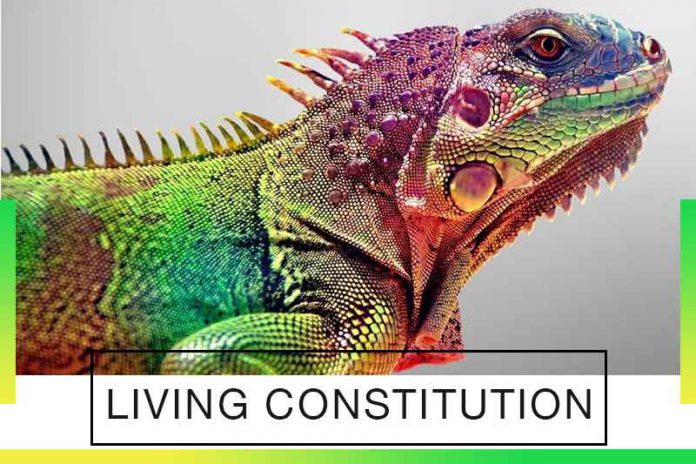Last Updated on January 15, 2023 by Constitutional Militia
As a constitutional rule of construction that cannot be repeated to often, “If *** we are at liberty to give old words new meanings *** there is no power which may not be conferred upon the general government”.[1] —or, for that matter, no power that may not be reallocated away from WE THE PEOPLE to the General Government or the States.[2]
“The Living Constitution”
“The living Constitution” amounts to a collection of legal fictions which rogue public officials concoct as they go along. “The living Constitution” is not based upon the actual words and phrases of the original Constitution or the Bill of Rights, except to the extent that officials coöpt the bare verbiage as empty vessels into which they then pour theretofore unheard-of meanings. Neither version recognizes the crucial legal distinction between the British and the American ideas of a “constitution”—namely that the Constitution of the United States is not a shot glass which officials may fill with whatever rot-gut legal moonshine a credulous population will swallow, but instead is an already printed page the words on which say what they mean and mean what they say, and neither more nor less. Neither version finds support in the history of the Founding Era—for no Framer, Founder, or American patriot of consequence has ever been discovered who publicly asserted that no one knew what some words or phrases in the original Constitution or the Bill of Rights meant at that time or might mean at any subsequent time, or that either the original Constitution or the Bill of Rights should be construed as a “living” document the meaning of which would and should change in the future, perhaps as soon as the very day after ratification. And neither version comports with elementary human psychology—for who would be so devoid of prudence as to agree to adopt a “constitution” the meaning of which in various important particulars was unknown to him, or could change in an unpredictable fashion at the hands of unknown individuals for unspecified reasons at an uncertain time thereafter?! No one would enter into the simplest of short-term commercial contracts that dealt with only one commodity, let alone submit every aspect of his life to a permanent government with wide-ranging powers, on such absurd terms.[3]
Contrary to popular misunderstanding, the basic technique of the “living” Constitution—manipulating the intertemporal changes in meanings of words and phrases to effect major substantive changes in governmental powers and disabilities—is nothing new. As recognized already in 1824, the Constitution was then undergoing a “metamorphosis” through reinterpretations of its language alien to WE THE PEOPLE’S understanding.[4] Madison, however, may have faulted for using the term “metamorphosis”. For the caterpillar and the butterfly are simply different stages in life of the selfsame creature; whereas a “living” Constitution is not really a Constitution at all, in the sense that one of the original intent is. Rather, the term “living” Constitution is simply an euphemism for those actual practices of public officials that, for whatever reason, have not alienated WE THE PEOPLE to the point of electoral or other revolt. The “living” Constitution covers for the exercise of authority limited only by politicians’ and judges’ abilities to befuddle the masses with plays on words and pilpulistic reasoning. As to governmental powers, the “living” rationalizes what may be fairly be described as usurpation and tyranny; as to governmental disabilities, it rationalizes nullification.[5]
Any use of the “living” Constitution injects chaos into both law and society. The Founding Fathers wrote the Constitution as a coherent, internally consistent document designed, in all its logically interlocking parts, to provide a legal framework for the on-going life of a great commonwealth. Unable to foresee all eventualities, the Founders provided for amendments (see Article V) no doubt presuming, as rational men, that any amendments would be drafted, debated, and adopted as integral components of an overarching plan.[6]
The “living” Constitution has one outstanding practical merit. It does not preclude interpreting the Constitution according to its original intent, whereby WE THE PEOPLE exercise direct control over the purse and the sword as State government institutions—“the Militia of the several States”. If WE THE PEOPLE finally decide to enforce that intent.





























